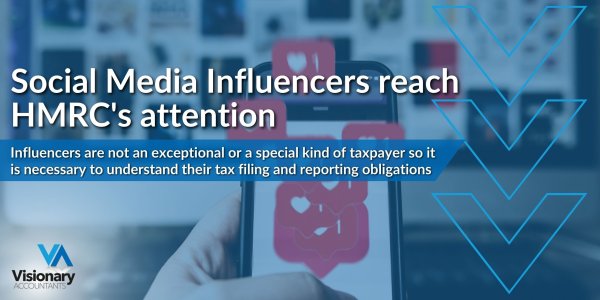Social Media Influencers reach HMRC's attention
Influencers: Love them or hate them, they're here to stay. Businesses are investing heavily to woo them, because they have a big impact on people's buying habits.
But, should they pay tax?
With posts reaching potentially millions of people in a matter of seconds, and some influencers having a big impact on people’s buying habits due to their perceived credibility in their chosen area, it is unsurprising to learn that businesses are prepared to invest large sums of money courting them.
Influencers come in all shapes and sizes, from those posting purely for pleasure with no aim or expectation of making money, to those who make it their career. The latter can make significant sums from posts which have been carefully designed and choreographed to produce the maximum impact.
Whilst it is true that the Competition & Markets Authority has issued advice and guidance to content creators and influencers in the areas of marketing and consumer protection, when it comes to finding help and advice on their taxes, there is no specific guidance out there that influencers can draw on. So, are there particular tax implications facing influencers and if so, what are they and how can they be addressed?
Firstly, influencers are not an exceptional or a special kind of taxpayer, so determining whether an influencer’s activities amount to a trade or not is usually a case of reviewing the badges of trade, as set out in HMRC’s Business Income Manual. Fortunately, for those engaged in ‘hobby-like’ activities, the trading allowance is available which allows individuals to earn up to £1,000 of gross income tax free each year, and avoids the necessity of registering as self-employed or engaging with HMRC.
If you are an influencer or content creator, seeking the correct tax advice is essential.
What are the different forms of income?
Calculating the level of an influencer’s taxable income in a given period can be problematic when the income comes from multiple and varied sources. Part of this income will be from creating posts online and this content creation is invariably produced and disseminated using a variety of different platforms.
The amounts of taxable income can vary based on how many followers the influencer has, the number of views content gets, or from the adverts that followers have viewed within a site. Sites such as Patreon and YouTube will also allow people to earn money from creating subscription services where subscribers pay to view content.
Income can also come from being a ‘brand ambassador’ or being engaged by a business to create content for promotion on the influencer’s social media feeds. Depending on the contract terms, some influencers may be effectively acting as an employee, whilst for others the role is more of a self-employed ‘consultant’. It is also possible that the individual could provide their services via some other form of trading vehicle such as a company.
Whichever form of trading is adopted, it is necessary to understand the tax filing and reporting obligations. Establishing whether an influencer is employed or self-employed is a relatively well trodden path (although not necessarily simple), requiring checking the terms of the engagement and using HMRC’s check employment status for tax (CEST) tool to establish the position.
A word of caution though: CEST is not always correct, so any results should be used as an indication of status only. If an influencer operates through their own company, they may be brought within the scope of the off-payroll working IR35 rules.
And where are the grey areas?
Then there are issues arising from unsolicited free products sent from businesses in the hope that influencers will provide positive endorsements.
- As an unsolicited ‘gift’, are they taxable?
- If so, how should it be valued – as a cost to the supplier or market value?
- What happens if the influencer doesn’t like the product and the post is negative?
For self-employed individuals, there is no concept of a ‘benefit in kind’ in the way that exists for employees, making this a grey area.
- For example, does a non-transferable holiday given to an influencer count as taxable trading income?
Clearly, more guidance is needed in this area. Consideration also needs to be given to what expenses are allowable.
What is HMRC’s approach?
Earlier this year, following receipt of third-party information, HMRC sent letters to individuals that they suspected of earning income through online platforms, asking them to certify that their affairs were in order by using the Digital Disclosure Service (DDS). This suggests that influencers are clearly in HMRC’s sights.
The world of social media content creation and influencers is growing, and these individuals need to understand their tax reporting and filing obligations. HMRC needs to produce accessible, clear, concise rules and guidance to ensure tax compliance and reduce demand for HMRC’s resources.
Conclusion: Take advice so that you don't get caught out
Our Senior Accountant in St Albans, Laura Mainwaring said:
“Social Media work is both rewarding and complex. While they can offer solid financial gains, it’s essential to navigate the potential tax implications adeptly. Every individual's situation and goals are unique. Tailored tax advice for influencers and content creators, built on a deep understanding of the ever-evolving tax landscape, is essential.”
Our dedicated team at Visionary Accountants is committed to providing tax advice, giving influencers and content creators peace of mind. Contact us today for support and advice.
